This post has already been read 2476 times!
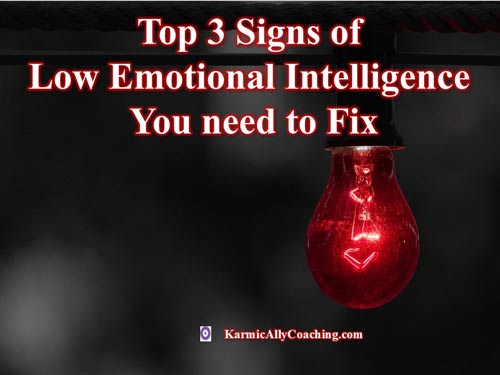
Did you take a stand against bullying this month?
It disturbs me a global phenomenon found in schools as well as the corporate world needs a day or even a month dedicated to raising awareness about it when we have all experienced it at some point in our lives.
We need to be proactive in preventing it every day of the year.
If you read this blog post you’d understand why I take a stand against school bullies and bullying in general.
Apart from being cowards, bullies are also toxic and need to be handled head on or put your mental health at risk.
Worse yet, they also have low Emotional Intelligence which influences their social relationships.
Some experts even believe that emotional intelligence has more of an impact on your chances of overall success in life when compared to one’s IQ.
While you may not be a bully or toxic, your emotional intelligence can play a significant role in how you interact with others, and with low emotional intelligence, you might find social situations difficult and full of tension. It also impacts your career success potential.
When TalentSmart tested emotional intelligence alongside 33 other important workplace skills, they found
- Emotional Intelligence to be the strongest predictor of performance, explaining a full 58% of success in all types of jobs
- 90% of top performers are also high in emotional intelligence.
- On the flip side, just 20% of bottom performers are high in emotional intelligence
If your career aspirations include a leadership role, this is one skill that you not only need to master (like yesterday) but you also have to be perceived as possessing a high Emotional Quotient.
How will you know you have low Emotional Intelligence?
One way of finding an answer to that question is to take an assessment (like the one I’ve shared above).
Another way is to look for indicators.
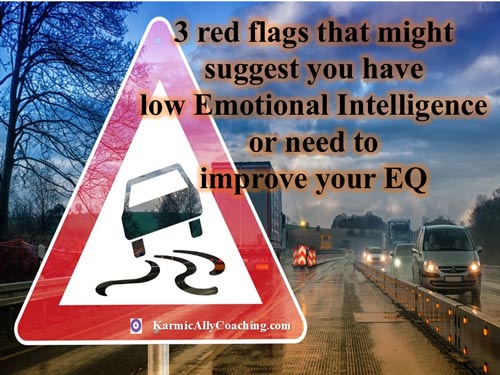
Here are my top 3 red flags that might suggest you have low emotional intelligence or need to improve your EQ.
You lack the skill of empathy
When you see someone suffering either physically or emotionally, what’s your reaction? Do you feel a desire to help them or offer words of comfort or do you shrug your shoulders and tell them to buckle up or tell them that ‘things happen’?
Even if you’ve never had the experience the other person is going through, it doesn’t mean you cannot acknowledge their situation or pain and offer a kind word.
I remember the time my pet April died a painful death due to wrong medication given by a stand-by vet which perforated her lungs.
My boss understood my need to take a few days off to help the other 3 dachshunds at home cope with this event. He knew I was preparing to take legal action – which I did and won after a full 18 month battle – the vet went to jail for 3 months and the Consumer Protection Act was amended for death by medical negligence.
The drug, Nimesulide drops was banned later after a few children died from it and a Public Interest Litigation by a Good Samaritan citizen.
Sadly his secretary didn’t and on my return to work, while others understood my feelings she told me it was only a dog and couldn’t believe a Manager would get emotional.
What happened next led to our boss counselling her on sensitivity and the need to maintain discretion about her views.
My boss obviously applied the exercise of Perceptual Positions and 18 years later, we are still in touch. And he still inquires about the health of my present furry family member!
You find it challenging to under how others feel
People that have low emotional intelligence are often oblivious to the feelings of others like the Secretary was.
They simply don’t get that someone might be angry or irritated with them.
While it may be difficult to read people in a situation, it’s not rocket science to observe, understand the emotional tone and then act appropriately to the situation.
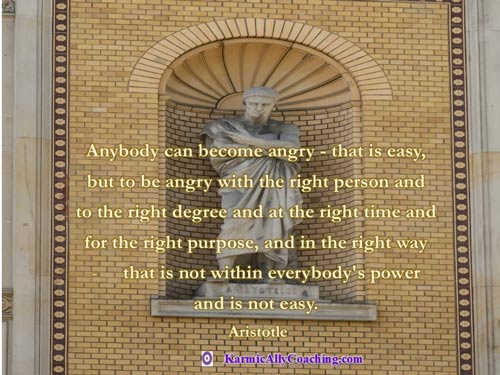
You seem to have arguments with everyone
It’s natural and even healthy to get angry about things that matter to you but if you’re finding yourself embroiled in arguments with everyone – family, friends, colleagues and strangers, then you need to pause and think about it.
Some people are angry by nature and need to develop anger management skills.
These people also have low emotional intelligence because of their inability to understand the feelings and emotions of others.
They tend to be overly critical of others and believe their point of view is the only one.
In contrast, an emotionally intelligent person will defend their point of view but will also be open to hearing the views of others and if they find merit in the other person’s opinion, they are open to reconsidering their point of view.
Such people are also unwilling to take responsibility for their mistakes or actions. Instead they take the easy exit route by blaming others for their problems or even justify their actions by saying they had no
Low emotional intelligence can wreak havoc in not only your life but the lives of others.
If any of the above signs sound familiar to you, it might be time to work on improving your emotional intelligence.
A quick win method to manage your Emotional Intelligence
There are countless ways to improve your overall life and improving your emotional intelligence can create a significant difference when it comes to your happiness and success.
If you’re looking to increase your emotional intelligence, then one of the fastest methods I can think of is to take a pause before you judge others.
In other words, resist knee-jerk reactions and pause. We usually think of knee-jerk reactions when it comes to emails or 2 am in the morning phone calls for reasons best left to the caller.
In fact, I wrote a blog post about email knee-jerk reactions some time back and the guidance in that post is relevant to anyone wanting to improve their Emotional Intelligence.
Judging others is often a knee-jerk reaction that has become second nature to many of us. However, if you want to increase your emotional intelligence, you need to identify your judgmental thoughts and try to pause before you make a quick judgment.
When you take the time to think about it, you may find that you are not upset at the person, but you are dealing with stress in another part of your life.
If developing your Emotional Intelligence is important for your career then consider How to Develop Emotional Intelligence with Ease, a step by step guide to help you develop self-awareness, improve your people skills and create happier relationships. Click the below image for the guide and 3 awesome bonus resources.


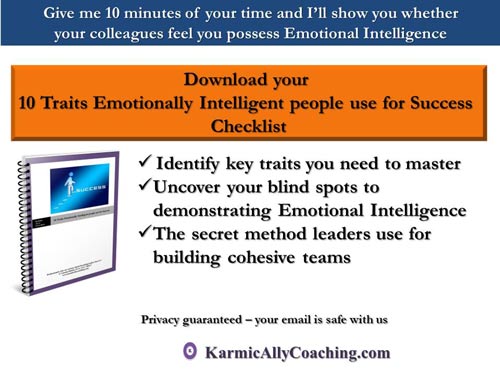
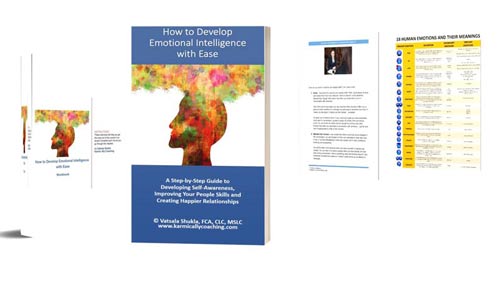

 I adhere to the Certified Coaches Alliance Code of Ethics and Standards. A copy is available on request.
I adhere to the Certified Coaches Alliance Code of Ethics and Standards. A copy is available on request.
 Let's Talk through the Connect Form:
Let's Talk through the Connect Form:
Emotional Intelligence is so key to our health and happiness. It’s also so important to the upleveling of our human consciousness and planet. Thank you for this great post and your inspired insights Vatsala <3
I agree with you Debra. If people were to apply Emotional Intelligence to different situations, there would be less energy spent on conflict and anger. Neither helps the world.
I love the recommendation to increase your emotional intelligence by not being judgmental. I always encourage curiosity and non-judgement to develop more mindfulness, which is a path way to developing more emotional intelligence. Thank you for sharing your wisdom!
Developing mindfulness helps to become both self and socially aware, Kelley. Thanks for pointing it out and thank you for working to raise awareness about being curious and non-judgmental. That’s an area many of us have to work on.
“If you’re looking to increase your emotional intelligence, then one of the fastest methods I can think of is to take a pause before you judge others.“ this got to me.
Thank you for sharing Vatsala
You’re welcome Leila!
Such an important topic Vatsala! Thanks for sharing your wisdom and the link between low EI and bullying.
You’re welcome, Pamela. I wanted to raise awareness about bullying this month and low EI is often overlooked when trying to understand the bully mindset.
This is a great subject, Vatsala!! I have read a lot and experienced a lot of narcissism, emotional abuse. Christiana Northrup calls it Energy Vampires and has a book by that title. It helps so much to know that the things you speak of here is exactly what’s behind all of it. It’s always to different degrees, but I now recognize it immediately. I finally learned how to draw boundaries, an invaluable skill to utilize!!
Have a great day!
Thanks for sharing your insights, Ruthie. Recognizing the signs is crucial to identify these energy vampires and for our self-preservation – like an Early Warning Tsunami Device, literally!